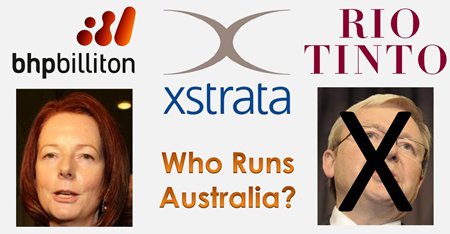Today
 Today (June 23, 2010)
Australian Labor Prime Minister Kevin Rudd was forced from office by mining
resource giants Rio Tinto, BHP Billiton and Xstrata through a challenge to his
leadership. Deputy Prime Minister Julia Gillard demanded the confidence vote
testing Rudd’s leadership in the Labor Party caucus. Julia Gillard won the vote
and assumes the post of Prime Minister. The Australian news website
News.Com.Au claims that the vote was triggered by the Australian Worker’s Union
saying, “The leadership challenge was sparked after the influential Australian
Workers' Union (AWU) switched its support from Mr Rudd to Ms Gillard.” Today (June 23, 2010)
Australian Labor Prime Minister Kevin Rudd was forced from office by mining
resource giants Rio Tinto, BHP Billiton and Xstrata through a challenge to his
leadership. Deputy Prime Minister Julia Gillard demanded the confidence vote
testing Rudd’s leadership in the Labor Party caucus. Julia Gillard won the vote
and assumes the post of Prime Minister. The Australian news website
News.Com.Au claims that the vote was triggered by the Australian Worker’s Union
saying, “The leadership challenge was sparked after the influential Australian
Workers' Union (AWU) switched its support from Mr Rudd to Ms Gillard.”
What makes this
of particular interest for Canada is that the political power of the resource
companies in Canada is similar in scope to Australia. As well what was at stake
was the Rudd attempt to impose a resource super profits tax (RSPT) on the mining
multi-nationals (See Communist Party of Australia Guardian article below for
background).
The mining
companies have been incensed that such an attempt to cut into their profits
would be made by an Australian Prime Minister. The mining corporations have
been attempting to discredit and remove Rudd since the tax was announced - today
they got their wish.
 Focus On Socialism posts the Guardian
article as an example of the power and reach of transnational resource companies
in state apparatus and the control that these very same resource companies hold
over Canadian workers as seen in Sudbury with the strike at Vale. Prime
Minister Harper and his theocratic anti-worker regime remain silent as the
mining giant holds Canadian workers and the nation hostage. Focus On Socialism posts the Guardian
article as an example of the power and reach of transnational resource companies
in state apparatus and the control that these very same resource companies hold
over Canadian workers as seen in Sudbury with the strike at Vale. Prime
Minister Harper and his theocratic anti-worker regime remain silent as the
mining giant holds Canadian workers and the nation hostage.Â
Canadian and
Australian mine workers are under similar attack. Guardian author Anna Pha asks
the question of real interest for Australian workers...Who Runs Australia.Â
Heading into the G8/G20 imperialist summit in Toronto, Canadians could ask the
same question of Prime Minister Harper...who runs Canada?
Who runs Australia?
The Guardian (Communist Party of
Australia – CPA)
June 22, 2010
http://www.cpa.org.au ,
cpa@cpa.org.au
,
guardian@cpa.org.au
By: Anna Pha
Prime Minister
Kevin Rudd was visibly shaken by the strong opposition of the mining
corporations to a resource super profits tax (RSPT). The mining companies are
angry, as much or more so with the government for not gaining their agreement
first as they are with the tax. And the battle they are waging is not just an
economic one about paying a bit more tax on their super profits. It is a
political struggle, a power struggle over who runs the country.
Rio Tinto, BHP
Billiton and Xstrata, three of the largest global mining monopolies have had an
extremely cosy relationship with the Rudd government. Up to now they were in the
driving seat. Resources Minister Martin Ferguson, in particular, was their
little darling. It was Ferguson who, according to The Financial Review
(19-20/6/2010), battled on their behalf and got the government to double its
compensation to coal miners under its proposed emissions trading scheme.
Friend of the
miners
Labor had opened
the floodgates on uranium mining, jettisoning its long-standing two-mine policy.
Labor perpetuated the Howard government’s Intervention in the Northern Territory
instead of providing communities with the infrastructure and job creation
programs they require. One of the prime aims of the Intervention is to force
people off their land to make way for the big mining corporations.
When Labor set
about abolishing the former Howard government’s AWAs (individual contracts), the
mining companies rushed in to sign workers up on new five-year contracts.
Employment Relations Minister Julia Gillard willingly agreed that the AWAs could
run their full term to 2013.
The RSPT is part
of a budget tax package which contains a 30 percent refund of mining exploration
costs, 40 percent compensation if mining companies make a loss, as well as a cut
in company profit tax from 30 to 28 cents in the dollar. It also effectively
abolishes mining royalties by refunding companies for the royalties they pay the
states. In addition, billions of dollars have been allocated to the provision of
infrastructure for the mining companies.
When Labor
introduced Fair Work Australia it invited the ACTU in for a chat but never
seriously negotiated a position that met ACTU demands or restored trade union
rights. Likewise, it made a few cosmetic changes to the Australian Building and
Construction Commission (ABCC), it did not negotiate
agreement with the building unions first.
It consulted and
negotiated with the Business Council of Australia, the Australian Industry
Group, the Minerals Council, the Master Builders and other employer
representatives. The Rudd Labor government is as close and subservient to big
business as Liberal and Labor governments before it ever were.
The mining
companies are no friends of workers or the environment. Cost-cutting short cuts
and scant regard for workers’ health and safety make mining one of the most
dangerous occupations in the world. The industry has the highest rate of
exploitation of any in Australia. Its attitude to the environment is scandalous.
It needs to be
asked: Why does an elected government have to get agreement with the mining
companies before it makes taxation changes?
Why are the
mining companies and not the elected government determining the extraction and
use of Australia’s non-renewable resources?
Why doesn’t the
elected government consult with the people of Australia who, as it points out,
own those resources? What is it doing to protect native title rights of the
original Indigenous owners?
State monopoly
capitalism
The government is
a tool of monopoly capital. It is used to hold down wages and working conditions
and suppress struggle – the ABCC and outlawing of strike action, etc. It
conducts foreign policy in the interest of the largest corporations; acts in
their interests with deregulation, privatisation, free trade agreements,
provision of infrastructure, tax concessions, handouts; and comes to their
rescue during times of crisis.
This relationship
with monopoly capital goes much deeper than just legislation and state
machinery. An examination of leading policy making bodies, government inquiries,
ministerial advisers and the like reveals that corporate representatives play a
critical role in the processes of government and policy making.
Take for example,
the Reserve Bank of Australia, Australia’s central bank with responsibility for
monetary policy. The nine board members of this “independent” (of government)
body include five with positions in large private corporations and one academic.
Their corporate
connections include James Hardy, Coca-Cola Amatil, CSL, Origin Energy, Wal-Mart
Stores (US retail), Fairfax Media, Brambles and BlueScope Steel. The other three
are the governor, deputy governor and secretary to Treasury. The academic has
positions in two reactionary think tanks – the Brookings Institution in the USA
and the Lowy Institute for International Policy.
Infrastructure
Australia has responsibility for developing a strategic blueprint for
Australia’s future infrastructure needs. Its head is leading business figure,
Sir Rod Eddington who is chairman of JPMorgan Australia, one of the world’s
largest investment banks.
His other
business connections include Rio Tinto, Allco Finance and News Corporation.
Heather Ridout, CEO of the Australian Industry Group (representing manufacturing
employers), is also a member. She was involved in the Henry Taxation Review (see
analysis The Guardian May 12). The other board members have relationships with
the IMF, Bankers Trust, Deutsche Bank, Minter Ellison lawyers and KPMG.
The Australian
Securities and Investments Commission is responsible for the regulation of
corporations, markets and financial services. Its chairman was the director of
the Business Council of Australia, and chief executive partner at Mallesons
Stephen Jaques – Australia’s largest law firm. The deputy chair was also a
partner at Mallesons.
The Future Fund
is responsible for the investment of more than $60 billion of public moneys. Its
chair is a former CEO of the Commonwealth Bank – having guided it through its
privatisation. Its other board members come from the finance sector and industry
– including Rio Tinto, JP Morgan, Rothschild Australia, Lend Lease Property
Investment Services, Civil and Civic and Private Equity. Former Liberal Party
Treasurer Peter Costello (appointed by Rudd) still holds an advisory position at
the World Bank. The staff responsible for investment policy have worked for a
range of investment, accounting, financial and other business organisations,
including ANZ, AMP, Towers Perrin, AXA, PricewaterhouseCoopers, Deloitte, Allco
Finance, Credit Suisse, JP Morgan, Bankers Trust, Pinnacle Property Group and
the IMF.
In addition to
big business reps running government bodies, there is a steady stream of
ex-state and federal MPs into highly lucrative positions in the private sector –
rewards for services rendered – who are invaluable in opening doors in
government.
The chair of the
National Health and Hospitals Reform Commission which provided the blue print
for the Rudd government’s plans to privatise Medicare and public hospitals works
for BUPA, one of the largest health insurers in the world. She also was a
partner at KPMG.
Deloitte, KPMG,
Ernst & Young and PricewaterhouseCoopers are known as the Big Four – the largest
accounting and professional service firms in the world. In 2009 these monopolies
had combined revenue of more than $100 billion. All are represented in some area
of government. They are typical of the international monopolies that dominate
industries.
The close
relationship between government and big business is known as state monopoly
capitalism. As can be seen from the above examples, the finance, mining,
manufacturing, retail and property interests are tightly interconnected with
government. As is US capital and the IMF and World Bank.
The mining
companies are fighting to hang onto every dollar of profit they can. They are
also determined to teach Rudd and the rest of the world that they are not to try
an RSPT or dare challenge their authority like that again.
The struggle
against the mining corporations is a struggle against monopoly capital. It is
the class struggle. This struggle takes place in all sectors of the economy.
What is unusual in the case of the mining corporations is that the government is
not on their side over the RSPT, although it has held back finalising its
legislation until it can gain their agreement.
These private
interests hold key positions on government bodies, influence governments with
huge political donations and the promise of six figure incomes when exiting
parliament. Their tentacles can be found everywhere, exploiting their employees
in the workplace, high interest rates; bank fees; monopoly pricing of petrol,
pharmaceuticals, food, electricity, and all the other basics in life.
If there is to be
real change in the interests of people, then that means taking on and defeating
the monopolies. It includes the nationalisation of major industries, including
the mining sector. Only a government of a new type can do that, a government
with the backing of a broad movement of forces including the working class,
students, small farmers and small business people. It requires a government that
puts people and the environment before profits.
The Guardian,
Editorial, 74
Buckingham Street, Surry Hills, Sydney NSW 2010, Australia
Communist Party
of Australia,
74 Buckingham
Street, Surry Hills, Sydney NSW 2010, Australia
General
Secretary: Dr Hannah Middleton
Phone (02) 9699
8844Â Fax: (02) 9699 9833Â
Email CPA
cpa@cpa.org.au
The Guardian
guardian@cpa.org.au
| 
